2026
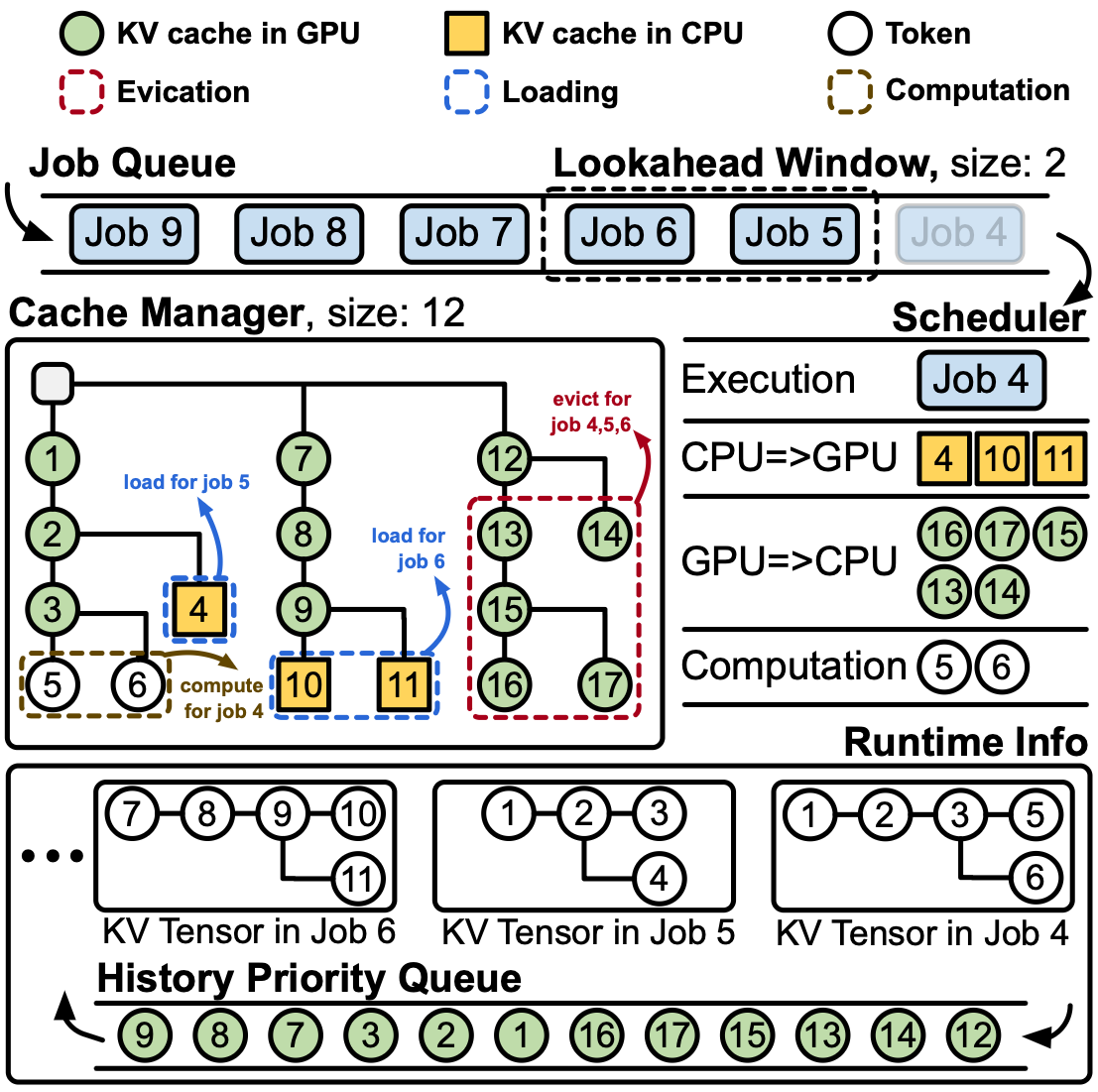
DepCache: A KV Cache Management Framework for GraphRAG with Dependency Attention
Hao Yuan, Xin Ai, Qiange Wang, Peizheng Li, Jiayang Yu, Chaoyi Chen, Xinbo Yang, Yanfeng Zhang, Zhenbo Fu, Yingyou Wen, Ge Yu
Special Interest Group on Management of Data (SIGMOD) 2026
We introduce dependency attention, a novel graph-aware attention mechanism that restricts attention computation to token pairs with structural dependencies in the retrieved subgraph. Unlike standard self-attention that computes fully connected interactions, dependency attention prunes irrelevant token pairs and reuses computations along shared relational paths, substantially reducing inference overhead. Building on this idea, we develop DepCache, a KV cache management framework tailored for dependency attention.
DepCache: A KV Cache Management Framework for GraphRAG with Dependency Attention
Hao Yuan, Xin Ai, Qiange Wang, Peizheng Li, Jiayang Yu, Chaoyi Chen, Xinbo Yang, Yanfeng Zhang, Zhenbo Fu, Yingyou Wen, Ge Yu
Special Interest Group on Management of Data (SIGMOD) 2026
We introduce dependency attention, a novel graph-aware attention mechanism that restricts attention computation to token pairs with structural dependencies in the retrieved subgraph. Unlike standard self-attention that computes fully connected interactions, dependency attention prunes irrelevant token pairs and reuses computations along shared relational paths, substantially reducing inference overhead. Building on this idea, we develop DepCache, a KV cache management framework tailored for dependency attention.
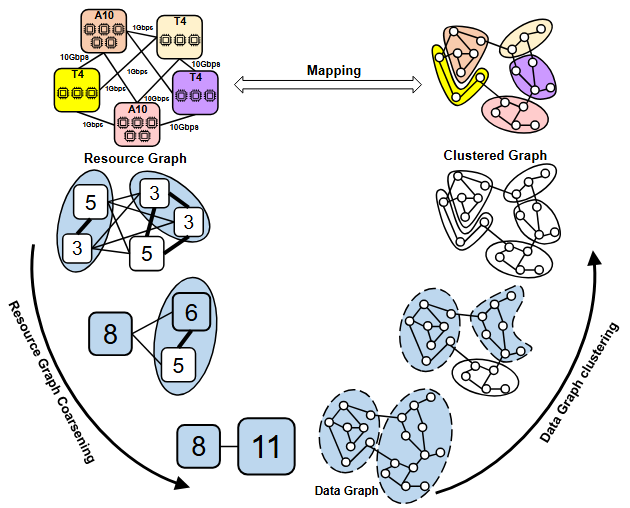
NeutronHeter: Optimizing Distributed Graph Neural Network Training for Heterogeneous Clusters
Chunyu Cao*, Xin Ai*, Qiange Wang, Yanfeng Zhang, Zhenbo Fu, Hao Yuan, Mingyi Cao, Chaoyi Chen, Yingyou Wen, Yu Gu, Ge Yu (* equal contribution)
Special Interest Group on Management of Data (SIGMOD) 2026
We present NeutronHeter, an efficient GNN training system for heterogeneous clusters. Our system leverages two key components to achieve its performance, including a multi-level workload mapping framework that transforms the complex multi-way mapping problem into a top-down workload mapping on a tree-like resource graph, and an adaptive communication migration strategy that reduces communication overhead by migrating communication from low-bandwidth links to local computation or high-bandwidth links.
NeutronHeter: Optimizing Distributed Graph Neural Network Training for Heterogeneous Clusters
Chunyu Cao*, Xin Ai*, Qiange Wang, Yanfeng Zhang, Zhenbo Fu, Hao Yuan, Mingyi Cao, Chaoyi Chen, Yingyou Wen, Yu Gu, Ge Yu (* equal contribution)
Special Interest Group on Management of Data (SIGMOD) 2026
We present NeutronHeter, an efficient GNN training system for heterogeneous clusters. Our system leverages two key components to achieve its performance, including a multi-level workload mapping framework that transforms the complex multi-way mapping problem into a top-down workload mapping on a tree-like resource graph, and an adaptive communication migration strategy that reduces communication overhead by migrating communication from low-bandwidth links to local computation or high-bandwidth links.
2025
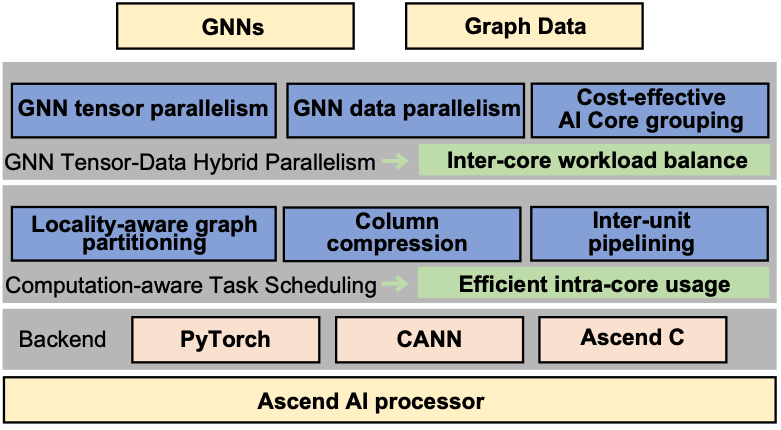
NeutronAscend: Optimizing GNN Training with Ascend AI Processors
Xin Ai, Bing Zhang, Qiange Wang, Yanfeng Zhang, Hao Yuan, Shufeng Gong, Ge Yu
Transactions on Architecture and Code Optimization (TACO) 2025
The Ascend AI processor is typically architected on multiple AI Cores that are physically decoupled and designed for dense matrix computation. When processing graph data with inherent sparsity and power-law distribution, the Ascend AI processors suffer from the inter-core workload imbalance and inefficient intra-core resource utilization. In this paper, we present NeutronAscend, an efficient GNN training framework tailored for the Ascend AI processor. NeutronAscend employs two critical designs for both inter-core and intra-core performance optimization.
NeutronAscend: Optimizing GNN Training with Ascend AI Processors
Xin Ai, Bing Zhang, Qiange Wang, Yanfeng Zhang, Hao Yuan, Shufeng Gong, Ge Yu
Transactions on Architecture and Code Optimization (TACO) 2025
The Ascend AI processor is typically architected on multiple AI Cores that are physically decoupled and designed for dense matrix computation. When processing graph data with inherent sparsity and power-law distribution, the Ascend AI processors suffer from the inter-core workload imbalance and inefficient intra-core resource utilization. In this paper, we present NeutronAscend, an efficient GNN training framework tailored for the Ascend AI processor. NeutronAscend employs two critical designs for both inter-core and intra-core performance optimization.
![NeutronRAG: Towards Understanding the Effectiveness of RAG from a Data Retrieval Perspective [Demo]](/assets/images/covers/sigmod-neutronrag.png)
NeutronRAG: Towards Understanding the Effectiveness of RAG from a Data Retrieval Perspective [Demo]
Peizheng Li, Chaoyi Chen, Hao Yuan, Zhenbo Fu, Xinbo Yang, Qiange Wang, Xin Ai, Yanfeng Zhang, Yingyou Wen, Ge Yu
Special Interest Group on Management of Data (SIGMOD) 2025
Existing RAG tools typically use a single retrieval method, lacking analytical capabilities and multi-strategy support. To address these challenges, we introduce NeutronRAG, a demonstration of understanding the effectiveness of RAG from a data retrieval perspective. NeutronRAG supports hybrid retrieval strategies and helps researchers iteratively refine RAG configuration to improve retrieval and generation quality through systematic analysis, visual feedback, and parameter adjustment advice.
NeutronRAG: Towards Understanding the Effectiveness of RAG from a Data Retrieval Perspective [Demo]
Peizheng Li, Chaoyi Chen, Hao Yuan, Zhenbo Fu, Xinbo Yang, Qiange Wang, Xin Ai, Yanfeng Zhang, Yingyou Wen, Ge Yu
Special Interest Group on Management of Data (SIGMOD) 2025
Existing RAG tools typically use a single retrieval method, lacking analytical capabilities and multi-strategy support. To address these challenges, we introduce NeutronRAG, a demonstration of understanding the effectiveness of RAG from a data retrieval perspective. NeutronRAG supports hybrid retrieval strategies and helps researchers iteratively refine RAG configuration to improve retrieval and generation quality through systematic analysis, visual feedback, and parameter adjustment advice.
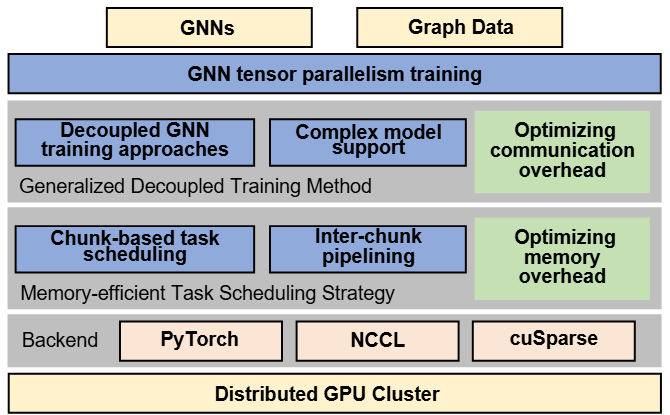
NeutronTP: Load-Balanced Distributed Full-Graph GNN Training with Tensor Parallelism
Xin Ai, Hao Yuan, Zeyu Ling, Xin Ai, Qiange Wang, Yanfeng Zhang, Zhenbo Fu, Chaoyi Chen, Yu Gu, Ge Yu
Very Large Data Bases (VLDB) 2025
We present NeutronTP, a load-balanced and efficient distributed full-graph GNN training system. NeutronTP leverages GNN tensor parallelism for distributed training, which partitions feature rather than graph structures. Compared to GNN data parallelism, NeutronTP eliminates cross-worker vertex dependencies and achieves a balanced workload.
NeutronTP: Load-Balanced Distributed Full-Graph GNN Training with Tensor Parallelism
Xin Ai, Hao Yuan, Zeyu Ling, Xin Ai, Qiange Wang, Yanfeng Zhang, Zhenbo Fu, Chaoyi Chen, Yu Gu, Ge Yu
Very Large Data Bases (VLDB) 2025
We present NeutronTP, a load-balanced and efficient distributed full-graph GNN training system. NeutronTP leverages GNN tensor parallelism for distributed training, which partitions feature rather than graph structures. Compared to GNN data parallelism, NeutronTP eliminates cross-worker vertex dependencies and achieves a balanced workload.
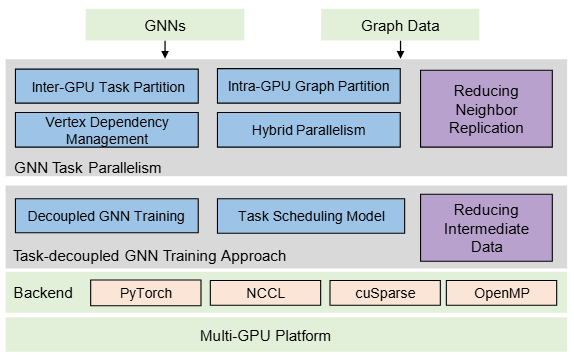
NeutronTask: Scalable and Efficient Multi-GPU GNN Training with Task Parallelism
Zhenbo Fu*, Xin Ai*, Qiange Wang, Yanfeng Zhang, Shizhan Lu, Chaoyi Chen, Chunyu Cao, Hao Yuan, Zhewei Wei, Yu Gu, Yingyou Wen, Ge Yu (* equal contribution)
Very Large Data Bases (VLDB) 2025
In this work, we propose NeutronTask, a multi-GPU GNN training system that adopts GNN task parallelism. Instead of partitioning the graph structure, NeutronTask partitions training tasks in each layer across different GPUs, which significantly reduces neighbor replication.
NeutronTask: Scalable and Efficient Multi-GPU GNN Training with Task Parallelism
Zhenbo Fu*, Xin Ai*, Qiange Wang, Yanfeng Zhang, Shizhan Lu, Chaoyi Chen, Chunyu Cao, Hao Yuan, Zhewei Wei, Yu Gu, Yingyou Wen, Ge Yu (* equal contribution)
Very Large Data Bases (VLDB) 2025
In this work, we propose NeutronTask, a multi-GPU GNN training system that adopts GNN task parallelism. Instead of partitioning the graph structure, NeutronTask partitions training tasks in each layer across different GPUs, which significantly reduces neighbor replication.
2024
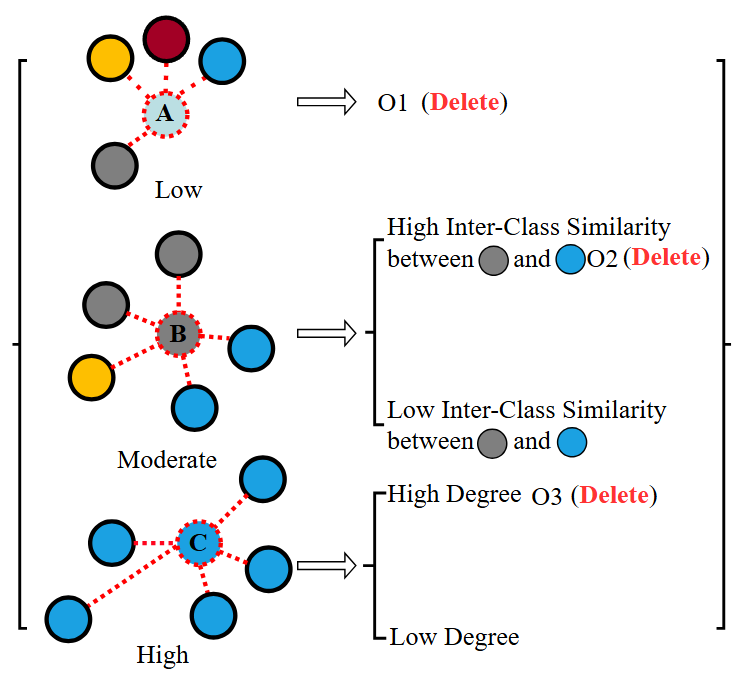
NeutronSketch: An in-depth exploration of redundancy in large-scale graph neural network training
Yajiong Liu, Yanfeng Zhang, Qiange Wang, Hao Yuan, Xin Ai, Ge Yu
Knowledge-Based Systems (KBS) 2024
In this work, we propose a universal, one-time redundancy removal method called NeutronSketch to remove the redundant information from the input graph. This method can improve the training efficiency while maintaining the model accuracy.
NeutronSketch: An in-depth exploration of redundancy in large-scale graph neural network training
Yajiong Liu, Yanfeng Zhang, Qiange Wang, Hao Yuan, Xin Ai, Ge Yu
Knowledge-Based Systems (KBS) 2024
In this work, we propose a universal, one-time redundancy removal method called NeutronSketch to remove the redundant information from the input graph. This method can improve the training efficiency while maintaining the model accuracy.
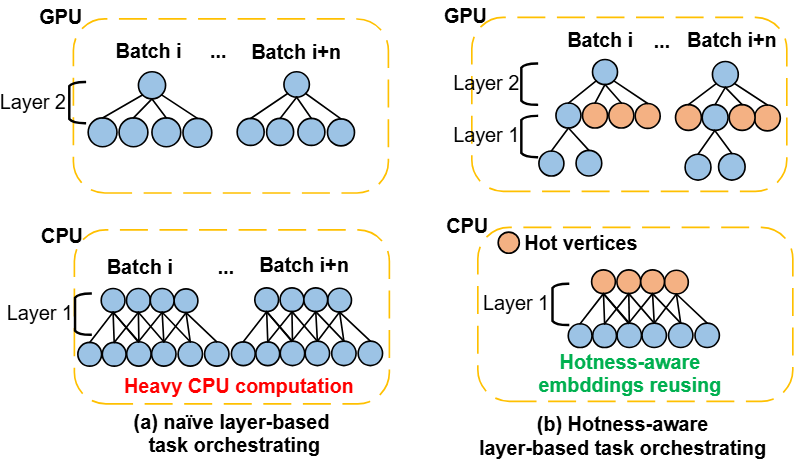
NeutronOrch: Rethinking Sample-based GNN Training under CPU-GPU Heterogeneous Environments
Xin Ai, Qiange Wang, Chunyu Cao, Yanfeng Zhang, Chaoyi Chen, Hao Yuan, Yu Gu, Ge Yu
Very Large Data Bases (VLDB) 2024
In this paper, we propose NeutronOrch, a system for sample-based GNN training that incorporates a layer-based task orchestrating method and ensures balanced utilization of the CPU and GPU. NeutronOrch decouples the training process by layer and pushes down the training task of the bottom layer to the CPU. This significantly reduces the computational load and memory footprint of GPU training.
NeutronOrch: Rethinking Sample-based GNN Training under CPU-GPU Heterogeneous Environments
Xin Ai, Qiange Wang, Chunyu Cao, Yanfeng Zhang, Chaoyi Chen, Hao Yuan, Yu Gu, Ge Yu
Very Large Data Bases (VLDB) 2024
In this paper, we propose NeutronOrch, a system for sample-based GNN training that incorporates a layer-based task orchestrating method and ensures balanced utilization of the CPU and GPU. NeutronOrch decouples the training process by layer and pushes down the training task of the bottom layer to the CPU. This significantly reduces the computational load and memory footprint of GPU training.
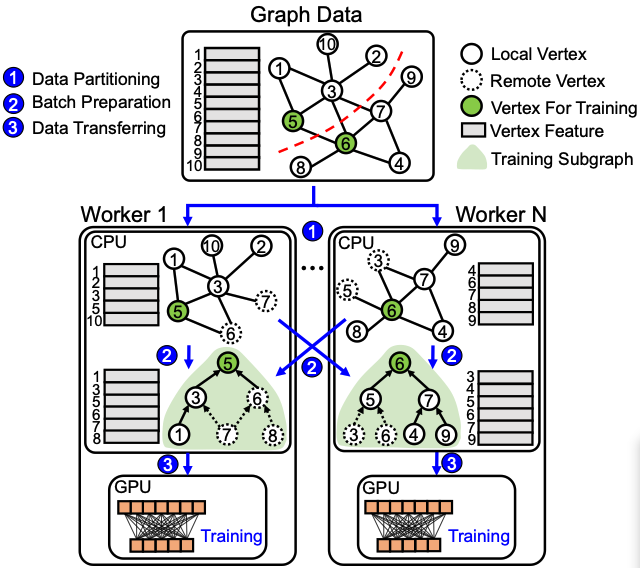
Comprehensive Evaluation of GNN Training Systems: A Data Management Perspective
Hao Yuan, Yajiong Liu, Yanfeng Zhang, Xin Ai, Qiange Wang, Chaoyi Chen, Yu Gu, Ge Yu
Very Large Data Bases (VLDB) 2024
This paper reviews GNN training from a data management perspective and provides a comprehensive analysis and evaluation of the representative approaches. We conduct extensive experiments on various benchmark datasets and show many interesting and valuable results. We also provide some practical tips learned from these experiments, which are helpful for designing GNN training systems in the future.
Comprehensive Evaluation of GNN Training Systems: A Data Management Perspective
Hao Yuan, Yajiong Liu, Yanfeng Zhang, Xin Ai, Qiange Wang, Chaoyi Chen, Yu Gu, Ge Yu
Very Large Data Bases (VLDB) 2024
This paper reviews GNN training from a data management perspective and provides a comprehensive analysis and evaluation of the representative approaches. We conduct extensive experiments on various benchmark datasets and show many interesting and valuable results. We also provide some practical tips learned from these experiments, which are helpful for designing GNN training systems in the future.